| |
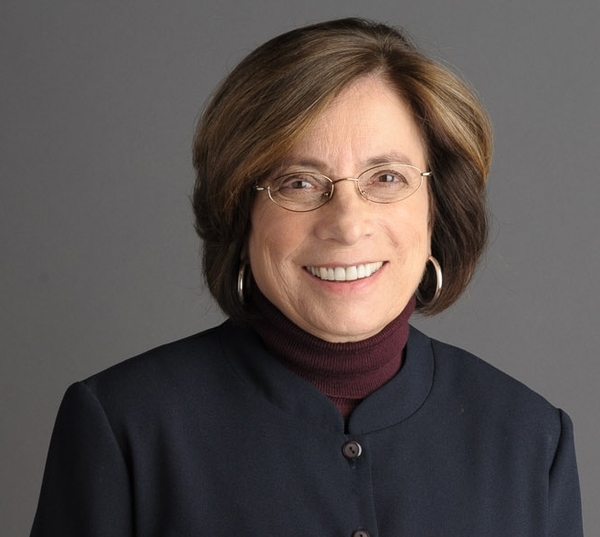 Councilmember Susan Wengraf Councilmember Susan Wengraf
October, 2019
|
Dear Friends and Neighbors,
Also included in this newsletter is an excellent, comprehensive report with data on homelessness in Berkeley, authored by my council colleague Rashi Kersawani, who represents District 1 (North West Berkeley). I was so impressed by this synopsis that I asked Rashi's permission to share it with all of you. We can all benefit from knowing this information as we grapple with the challenges that homelessness is presenting in Berkeley.
Included in this newsletter is information about:
|
 Facts About Berkeley Homelessness (courtesy of Rashi Kesarwani) Facts About Berkeley Homelessness (courtesy of Rashi Kesarwani)
|
Every two years, communities nationwide conduct a comprehensive count of people experiencing homelessness, as required by the Federal Department of Housing and Urban Development.
Last month, we received detailed results of the 2019 homelessness point-in-time count that occurred on January 30th in Alameda County. The Berkeley numbers showed a total of 1,108 people who are homeless - a 14% increase over the 2017 count. It's important to keep in mind that this count is necessarily an underestimate of the number of people expected to experience homelessness in Berkeley in 2019, which is about 2,000,
because it doesn't capture people who exited homelessness prior to the count nor people who will become homeless after the count.
The count was followed by a countywide survey that included 257 unsheltered and sheltered homeless individuals in Berkeley, providing a profile of the population. The full report contains a lot of detail:
1.
Disproportionately African American While only 9% of the city's general population is African American, 57% of all homeless individuals are African American.
2.
Vast Majority Are Unsheltered Of the 1,108 homeless individuals counted, 73% (or 813 people) are unsheltered; sheltering in an RV, car, or van is considered unsheltered, and those numbers are on the rise when compared to the 2017 count:
- 251 in tents
- 231 on street/outdoors
- 161 in RVs
- 157 in cars/vans
- 13 in abandoned buildings
3.
Vast Majority from Alameda County While the survey does not ask respondents if they're from a particular city, the vast majority (73% of Berkeley survey respondents) reported being from Alameda County:
- 48% reported living in Alameda Co. for +10 years
- 16% reported living in Alameda Co. for 5-9 years
- 18% reported living in Alameda Co. for 1-4 years
- 14% reported living in Alameda Co. for less than 1 year
- 3% refused to answer
4.
Highest Concentration in West Berkeley The highest concentration of people who are unsheltered is in West Berkeley.
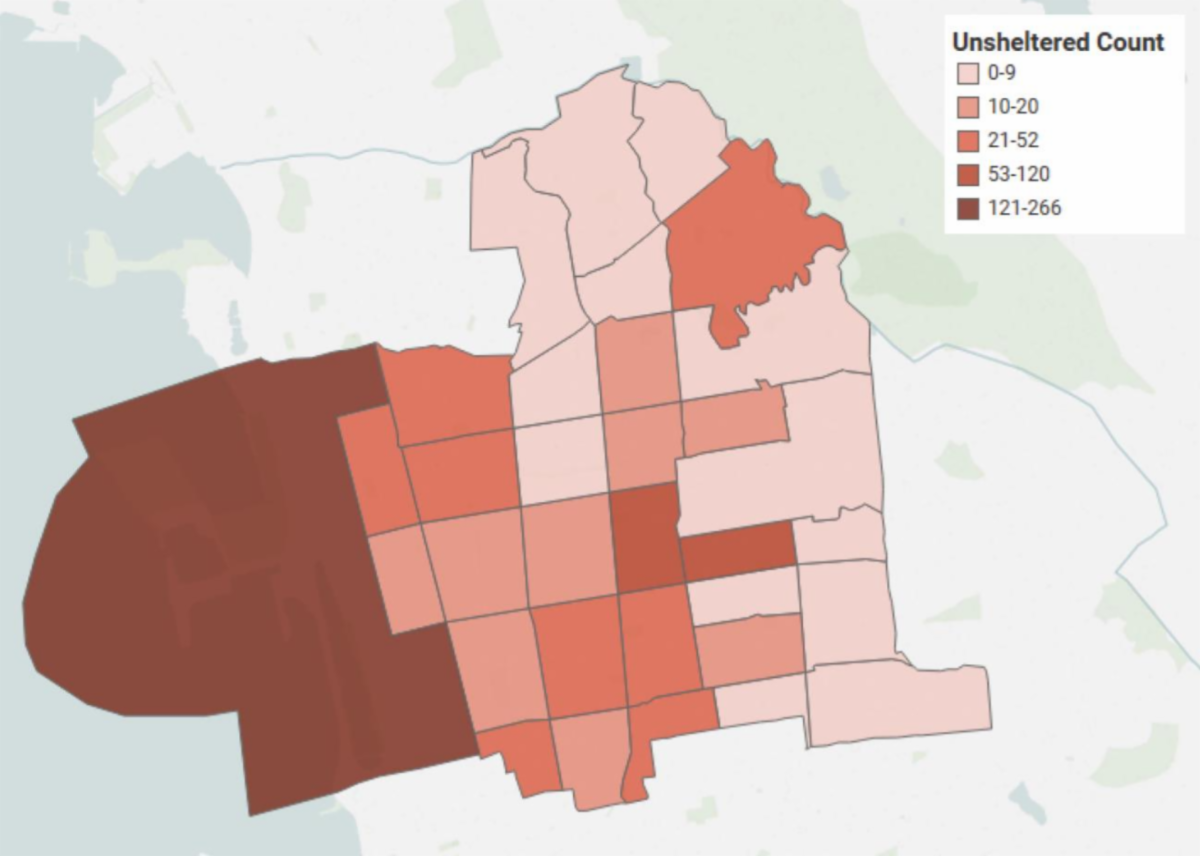
Homelessness Spending
Berkeley has budgeted a total of
$24 million for direct homeless services in FY19-20 from a combination of local, state, federal, and other sources.
FY19-20 Homelessness Budget by Fund Source
(Dollars in Millions)
A total of about $10.6 million is from local funds - both General Fund and the voter-approved Measure P, as well as from an increase of the transfer tax for the top third of real estate transactions.
FY19-20 Homelessness Budget by Service
(Dollars in Millions)
The largest share of dollars funds permanent supportive housing. The pie chart below excludes services funded by Measure P, as the final allocations will be approved in November.
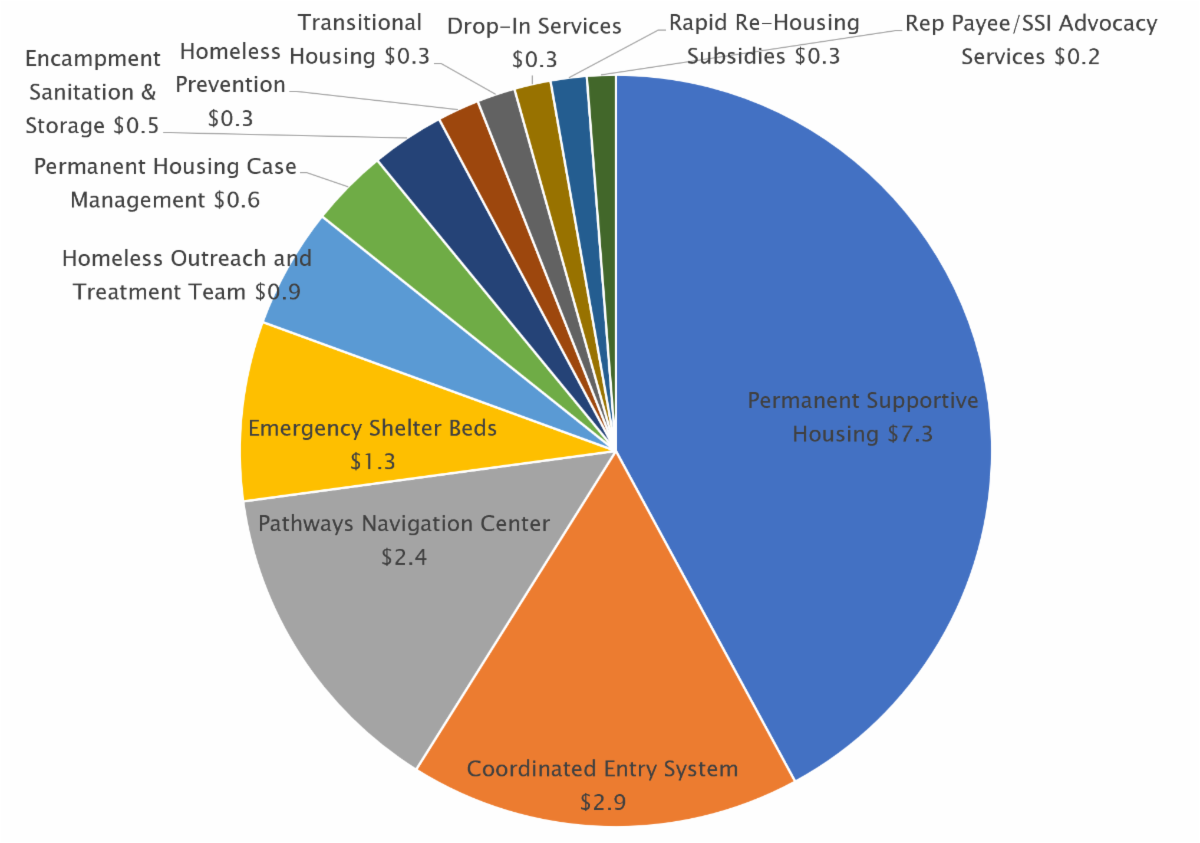
Detailed Homelessness Budget for FY19-20
(Dollars in Millions)
The table below displays the FY19-20 homelessness budget by service and by fund source.
-
Notably, the City spends a total of $1.3 million to fund 244 shelter beds, with an additional 45 beds funded through Pathways Navigation Center, for a
total of 289 shelter beds.
- The 45 shelter beds at Pathways are significantly more expensive (a total of $2.4 million) than the 244 traditional emergency shelter beds because Pathways is doing far more than simply providing respite from the outdoors; staff work to place people into permanent housing and rapid rehousing subsidies are sometimes provided to support clients as they transition. The total $2.4 million reflects these higher costs.
- Here again, services to be funded by Measure P have been excluded, as final allocations will be approved in November. One possible use of funds is to transform traditional shelters into navigation centers so more people can successfully transition to permanent housing.
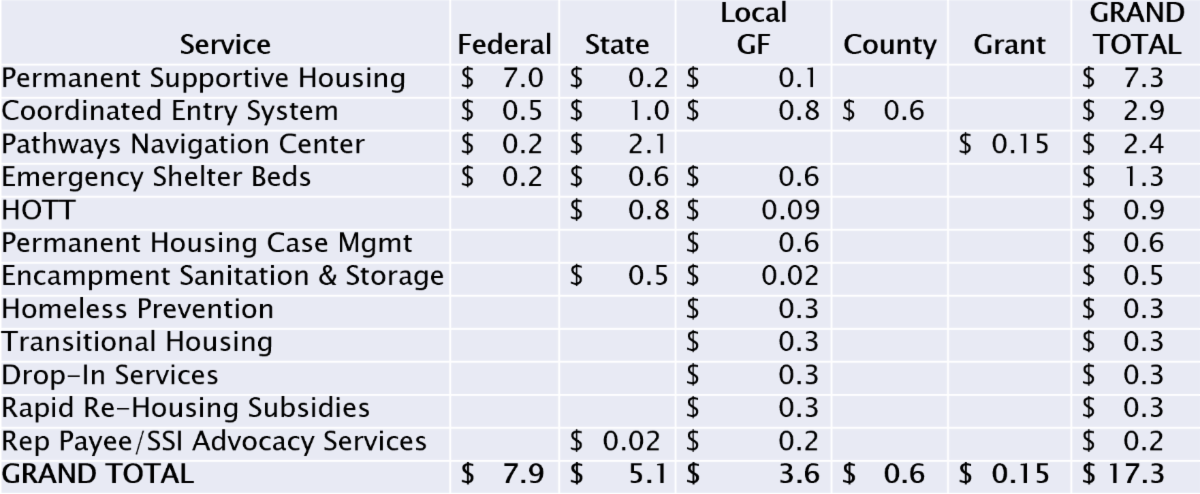
Encampment Outreach - Insufficient Resources
Berkeley's policy for addressing encampments is governed by a federal Ninth Circuit Court of Appeals decision known as
Martin v. Boise.
The case was brought by homeless individuals in Boise, Idaho, who challenged Boise's ordinance banning camping in public spaces.
The Court decision essentially states
that
if a city doesn't have enough shelter beds available, enforcing a camping ban like Boise's, violates the constitutional ban on cruel and unusual punishment:
"...as long as there is no option of sleeping indoors, the government cannot criminalize indigent, homeless people for sleeping outdoors, on public property, on the false premise they had a choice in the matter."
However, the decision specifies exceptions to this standard:
- "Nor do we suggest that a jurisdiction with insufficient shelter can never criminalize the act of sleeping outside. Even where shelter is unavailable, an ordinance prohibiting sitting, lying, or sleeping outside at particular times or in particular locations might well be constitutionally permissible [emphasis added]."
- "So, too, might an ordinance barring the obstruction of public rights of way or the erection of certain structures."
Berkeley does have a sidewalk policy that requires individuals to consolidate their belongings into a nine-square-foot space so that everyone has equal access to the sidewalk, particularly individuals using wheelchairs or other mobility aids.
Berkeley currently has a total of 289 shelter beds. Meanwhile, the point-in-time count shows a total of 482 people in tents, on streets, or outdoors (and a total of 813 unsheltered individuals when counting people in cars, vans, RVs, and abandoned buildings-all considered unsheltered conditions). Because the City doesn't have enough shelter beds to accommodate everyone who is unsheltered, City staff must prioritize encampment outreach based on the most serious health and safety concerns received from our 311 City service system. Using the Martin v. Boise standard, City staff may clear an encampment due to health and safety concerns (such as fire risk, obstructed access, public health, etc.) and offer individuals shelter beds.
Many homeless people refuse to go to a shelter for the following reasons:
- 31% said Bugs
- 26% said Curfews
- 22% said Lack of Privacy
- 21% said Too Crowded
- 19% said Nowhere to store my stuff
In another question, homeless individuals were asked about the type of housing desired, with the following results:
- 52% said Independent, Affordable Rental Housing
- 19% said Housing with Support Services
- 13% said Clean and Sober Housing
- 3% said Assisted Living (24-Hour Care)
- 4% said Other Housing
- 2% said Not Interested in Housing Now
- 6% Refused to Answer Question
The results of both of these survey questions underscore the difficulties we face as a mid-sized city addressing homelessness. In the absence of robust investment from the federal government in affordable housing, we lack the revenue needed to provide a substantial number of permanently affordable homes. To help put this into context, the Berkeley Way Project will cost a total of $110 million (roughly $26 million of which comes from local sources, such as the Measure O affordable housing bond proceeds) and the facility will provide 89 affordable homes to individuals earning between 50% to 60% of the Area Median Income. In addition, Berkeley Food and Housing Project will provide the following:
- Temporary housing for 32 adult homeless men
- 53 units of permanent supportive housing for homeless and disabled men and women
- Transitional housing for 12 homeless male veterans (in partnership with the VA)
- Offices for support staff and partner agencies such as LifeLong Medical and Berkeley Mental Health
- A commercial kitchen and dining facility for meal services
When considering the cost and number of affordable units to be created at the Berkeley Way Project, it's clear that our region-and others across the country-need massive federal investment to fully meet the needs of our homeless population. A recent Bay Area Council report on homelessness noted that it would cost
$12.7 billion to fully house everyone who is homeless in the Bay Area
. This doesn't mean that we should give up on this long-term vision, but we need to recognize what it requires. One promising option at the state level is Assembly Bill 1487 (awaiting the Governor's signature), which would create a Bay Area regional housing entity to fund affordable housing to meet a portion of the unmet need. Statewide Propositions 1 and 2 approved by voters last November will provide a total of $6 billion in new resources. Proposition 1
will authorize a total of $4 billion in bonds to fund veterans and affordable housing, and Proposition 2 will fund up to $2 billion in bonds for housing for those with mental illness who are homeless. At the federal level, Congresswoman Maxine Waters has introduced HR 1856 the End Homelessness Act to provide $13.3 billion in new funding over five years.
|
|  Emergency Prep Fair Emergency Prep Fair
|
|
|
|
Click Image for more information
|
|
| Back to top |
|
| |
 Free Household Hazardous Waste & Mattress Dropoff Free Household Hazardous Waste & Mattress Dropoff
|
The Alameda County Household Hazardous Waste Drop-off program has a free one-day event in Albany at Golden Gate Fields on
Sunday, October 13, 2019 9am - 1pm
Residents can drop off unlimited mattresses and box springs at this event.
Fill out the form here to make an appointment. You will receive a confirmation e-mail with the event's address (appointments are required in order to keep a steady flow of traffic). Space is limited. Register early to guarantee that you get an appointment.
Your information will be kept confidential and will only be used by the Alameda County Household Hazardous Waste Program and StopWaste. Only Alameda County Residents can participate.
What We Can Take at One-Day Events:
- Pest & Garden products
- Batteries
- Fluorescent Bulbs
- Paints
- Electronics & Small Appliances
- Propane
- Medicine (including controlled substances)
- Oil, Gasoline, Auto Fluids
- Cleaners
- Sharps Containers
What We Can't Take at One-Day Events:
- Asbestos
- Explosives/Radioactives
- Railroad Ties & Treated Wood
- Fire Extinguishers
- Compressed Gas Cylinders other Than Propane
- Large Appliances (A/C, Refrigerators, Stoves, Washers, etc.)
- Construction and Demolition Waste
- Smoke Detectors
|
|
|
 Too Many, Too Loud, Too Often: Airplane Noise Too Many, Too Loud, Too Often: Airplane Noise
|
Are you bothered by noise and vibration from airplanes flying over your home?
A volunteer organization, Save Our Skies, is asking for your help. I served as Berkeley's representative on the Oakland Airport Noise Forum Board for several years. I worked closely with the residents who organized Save Our Skies East Bay. They are a group of very smart, well-informed and hard-working neighbors dedicated to reducing noise from low flying airplanes over the East Bay hills.
After years of collecting data about noise from airplanes flying directly over our homes, and lobbying Washington, the FAA has been unresponsive. Save our Skies East Bay needs your help. Now is the time to let them know your concerns.
Let the Oakland Airport Noise Forum and the FAA see and hear your anger and frustration by attending the last Noise Forum meeting of 2019,
Wed. Oct 16, 6:30 pm.
Port of Oakland Board Room
530 Water Street, 2nd Floor
Jack London Square, Oakland
- Come to the October Noise Forum meeting & Carpool with your neighbors!
- Talk to your neighbors
- Share this email
- Encourage others to complain
- Share our website and Facebook page
For more information about Save Our Skies East Bay, go to: SOSeastbay.org
|
|
|
 Mental Health Crisis Line Mental Health Crisis Line
|
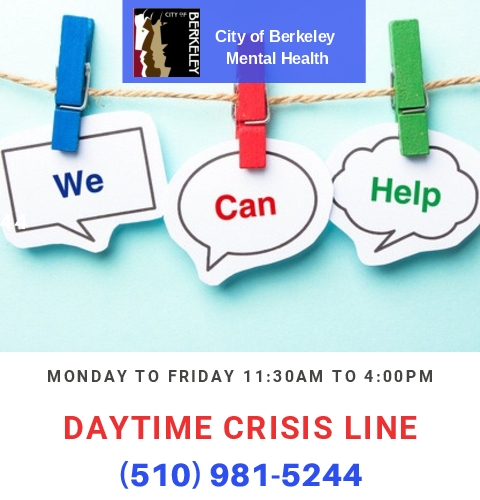 To better support individuals with mental health concerns, the city of Berkeley is now offering a new crisis line to offer support, consultation, and resources. Call (510) 981-5244, Monday through Friday 11:30 AM - 4:00 PM. To better support individuals with mental health concerns, the city of Berkeley is now offering a new crisis line to offer support, consultation, and resources. Call (510) 981-5244, Monday through Friday 11:30 AM - 4:00 PM.
If you are experiencing uncomfortable thoughts, emotions, or challenges in your life, a trained counselor on the crisis line will be available to talk directly to you, connect you to the right resources, and determine if an immediate in-person evaluation for your safety is needed.
The goals are to better support individuals with mental health concerns and to provide early intervention for mental health crises.
Outside of the crisis line hours of operation, individuals in mental health crisis, their families, and community members can:
- Come to the Berkeley Mental Health Clinic at 1521 University Avenue in Berkeley Monday through Thursday 8:00 AM - 1:30 PM
- Call Berkeley Mental Health's Crisis, Assessment, and Triage team at (510) 981-5244 Monday through Friday 8:00 AM - 4:00 PM
- Call the Mobile Crisis Team every day 11:30 AM - 10:00 PM, by calling the police non-emergency number at (510) 981-5900 or by leaving a voicemail at (510) 981-5254
- Call the 24-hour crisis line for immediate support through Crisis Support Services of Alameda County at 1-800-309-2131
- Call the Alameda County ACCESS (Acute Crisis Care and Evaluation for Systemwide Services) Program for questions about mental health services and eligibility at 1-800-491-9099 Monday through Friday 8:30 AM - 5:00 PM
|
 Emergency Notifications Emergency Notifications
|
 AC Alert will be Berkeley's primary emergency alerting system for the public. It is one of the tools the City of Berkeley uses to communicate emergency information and instructions to the community. AC Alert can send: AC Alert will be Berkeley's primary emergency alerting system for the public. It is one of the tools the City of Berkeley uses to communicate emergency information and instructions to the community. AC Alert can send:
- Voice alerts to phones
- SMS text messages
- Email
- TTY/TDD messages
Listed AT&T "land lines" are automatically included to receive voice messages from AC Alert for emergency warnings. Community members must sign up to receive voice or text alerts on cell phones, VoIP phones, unlisted phones, TTY/TDDs or through email.
If you want to receive emergency alerts and updates, sign up for AC Alert.
|
 311 311
|
 Need a new refuse can? Need a new refuse can?- Have a favorite pothole you want filled?
- Want to report illegal dumping?
|
|
| |
Susan Wengraf
Berkeley City Council District 6
(510) 981-7160 |
 |
|
|
| |
|